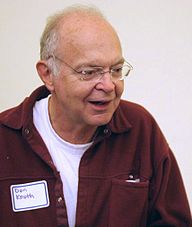|
Donald Knuth
|
|
|---|---|

Knuth in 2005
|
|
| Born |
Donald Ervin Knuth
January 10, 1938 (age 82) Milwaukee, Wisconsin, U.S.
|
| Nationality | American |
| Alma mater |
|
| Known for | |
| Spouse(s) | Nancy Jill Carter |
| Children | 2 |
| Awards |
|
| Scientific career | |
| Fields | |
| Institutions | Stanford University |
| Thesis | Finite Semifields and Projective Planes (1963) |
| Doctoral advisor | Marshall Hall, Jr. |
| Doctoral students | |
| Website | cs.stanford.edu/~knuth |
Donald Ervin Knuth (/kəˈnuːθ/ kə-NOOTH; born January 10, 1938) is an American computer scientist, mathematician, and professor emeritus at Stanford University. He is the 1974 recipient of the ACM Turing Award, informally considered the Nobel Prize of computer science.
He is the author of the multi-volume work The Art of Computer Programming. He contributed to the development of the rigorous analysis of the computational complexity of algorithms and systematized formal mathematical techniques for it. In the process he also popularized the asymptotic notation. In addition to fundamental contributions in several branches of theoretical computer science, Knuth is the creator of the TeX computer typesetting system, the related METAFONT font definition language and rendering system, and the Computer Modern family of typefaces.
As a writer and scholar, Knuth created the WEB and CWEB computer programming systems designed to encourage and facilitate literate programming, and designed the MIX/MMIX instruction set architectures. Knuth strongly opposes granting software patents, having expressed his opinion to the United States Patent and Trademark Office and European Patent Organisation.
- Digital Typography
- Dancing Links
- Mathematical Writing
- Computer Programming as an Art
- Selected Papers on Fun and Games
- Concrete Mathematics
- Literate Programming
- Mathematics for the Analysis of Algorithms
- An Interview with DONALD E. KNUTH
- Stable Marriage and Its Relation to Other Combinatorial Problems: An Introduction to the Mathematical Analysis of Algorithms
- The TEXbook
- The Sandwich Theorem
- The Early Development of Programming Languages
- The Art of Computer Programming - A draft of section 7.2.1.1: Generating all n-tuples
- A Recurrence Related to Trees
- An Empirical Study of FORTRAN Programs - Computer Science
- The Genesis of Attribute Grammars
- Big Omicron and big Omega and big Theta
- Joint Review of Algorithmic Barriers Falling: P=NP?
- The Complexity of Songs
- The Errors of TEX*
- The Computer as Master Mind
- The correspondence between Donald E. Knuth and Peter van Emde Boas on priority deques during the spring of 1977
- Breaking Paragraphs into Lines*
- An Earthshaking Announcement
- Axioms and Hulls
- The Metafont book
- The Art of Computer Programming, Volume 4A: Combinatorial Algorithms
- Structured Programming with go to Statements
- Surreal numbers
- MMIXware: A RISC Computer for the Third Millennium
- Programming Languages and Systems - ESOP'94
- Things a Computer Scientist Rarely Talks About
- The CWEB System of Structured Documentation
- Overlapping Pfaffians
- Random Matroids*
- Algorithms in Modern Mathematics and Computer Science
- Arithmetik
- Matroid Partitioning
- A review of "Structured Programming"
- Algorithmic Themes
- Virtual Fonts: More Fun for Grand Wizards
- A torture test for TEX
- The PLtoTF processor
- Von Neumann's First Computer Program
- Companion to the papers of Donald Knuth
- The Stanford GraphBase: A Platform for Combinatorial Computing
- Selected Papers on Computer Languages